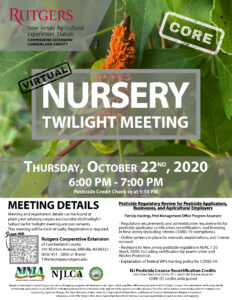The Atlantic County Economic Alliance shared this important news:
~ IMPORTANT! LAST DAY! ~
This is an important reminder from the New Jersey Economic Development Authority that preregistration for phase III of New Jersey’s emergency grants program for eligible small businesses is open until 5 p.m. today, Oct. 27.
Any small business that would like to apply for a grant must preregister. For more information and to preregister, please do so by clicking HERE and follow the instructions and links found on the FAQ page.
By preregistering, many small businesses and restaurants can join the many others that have already teamed up with the EDA to receive vital funding that has allowed them to remain open.
The ACEA Team
609-245-0019

